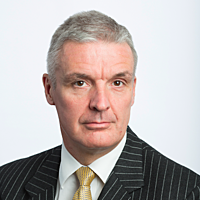The world economy has backed itself into a corner

BMO
The European Central Bank has cut its deposit rate from negative 0.4% to negative 0.5% and is restarting quantitative easing by buying debt at a rate of 20 billion euros a month “for as long as necessary.”
Mr Draghi, in one of his final pronouncements prior to retiring as ECB President next month, stated that “...we have headroom to keep going on for some time at this rhythm...we still think the probability of recession for the euro area is small, but it’s gone up.” The ambition is to maintain rates at similar levels until inflation “robustly” converges on the goal of just below 2%.
Having tried 80 billion euros a month asset purchases, with no noticeable impact on growth or inflation, Mr Draghi now feels that 20 billion euros may do the trick. Could it be that these policies are counter-productive? The eurozone is reporting dismal growth with the largest country, Germany, possibly now in a technical recession.
Our view is that such measures weaken confidence amongst investors and consumers whilst decimating the hopes and plans of savers and the growing army of retirees. There is also the small matter of the inherent dysfunction of the eurozone. Nineteen disparate economies with the one currency, one official interest rate but nineteen Parliaments. If you started with a blank piece of paper, it’s not something you would create.
Around US$14 trillion of government and corporate bonds are now offering negative nominal yields. This is about 24% of total issuance (source: OECD). With the European Central Bank marching further into negative interest- rate territory and re-starting QE the quantum of negative yielding bonds is set to increase. Is this crazy? Actually, we think it is beyond crazy.
Negative real yields also now seem standard. Using inflation rates for the year to August we find the following: US inflation 1.75%, 10-year bond yield 1.6%; German inflation 1.0%, 10-year bond yield -0.6%; Japanese inflation 0.2%, 10-year bond yield -0.2%; UK inflation 2.6%, 10-year bond yield 0.5% (source: Refinitiv Datastream).
Have negative interest rates helped push inflation higher? We see no evidence. Have negative interest rates stimulated long-term capital investment? We see no evidence. Have negative interest rates helped create bubbles in equities and various other asset classes. We see plenty of evidence.
In other words, the specific objectives of negative interest rates are not being met. In the meantime, global debt marches to ever-higher peaks. Governments (other than the US) feel hamstrung when it comes to budget deficits because of their existing heavy debt load but, in many instances, there seems little option but to push the fiscal pump. Germany is wary of deficits but in the eurozone it is the one country that could certainly afford to use that lever. So far, it has not.
The world economy has backed itself into a corner. A corner characterised by extremely low or no growth, low or no interest rates, low inflation and masses of debt. The way to get out of the corner is through higher growth but that will only come about when confidence is restored, sensible long-term capital investment decisions initiated, a more buoyant consumer emerges, and interest rates and inflation reflect a more positive economic outlook. To that we could add the end of the damaging trade war and the Brexit fiasco.
The market mechanism is disrupted by the intervention of central banks. Indeed, it can be argued they helped inflate the bubble that led to the financial crisis of 2007-9. We have always advocated a light or even invisible touch by central banks, but now they have become accustomed to the direct manipulation of market prices they find it hard to give up. In so doing they have helped preserve the existence of unproductive “zombie” companies. For the sake of the long-term health of the world economy our view is that the market must be allowed to function. If this results in another severe economic hiccup prior to restoration of “normality” so be it.
Access a global multi-asset investment strategy
Pyrford seeks to provide a stable stream of real returns over the long term with low absolute volatility and significant downside protection. To find out more, click the 'contact' button below.
BMO Global Asset Management (Asia) Limited (ARBN 618067959), Pyrford International Ltd (ARBN 165504414) and LGM Investments Limited (ABN 19 381 443 479) are exempt from the requirement to hold an Australian financial services licence under the Corporations Act in respect of the financial services each provides to "wholesale" investors (as defined in the Corporations Act) in Australia. Pyrford International Ltd and LGM Investments Limited are regulated by the Financial Conduct Authority under UK laws, and BMO Global Asset Management (Asia) Limited is regulated by the Securities and Futures Commission under Hong Kong laws, which differ from Australian laws.
BMO Global Asset Management (Asia) Ltd ARBN 618067959 is exempt from the requirement to hold an Australian financial services license under the Corporations Act in respect of the financial services it provides to wholesale investors (as defined in the Corporations Act) in Australia. BMO Global Asset Management (Asia) Ltd is incorporated in Hong Kong and authorised and regulated by the Hong Kong Securities and Futures Commission under Hong Kong laws, which differ from Australian laws.

Tony joined Pyrford in 1989 and headed its European and UK investment management activities before becoming Chief Executive and Chief Investment Officer in January 2011. Tony has a Masters of Arts degree and is a CFA.
Expertise

Tony joined Pyrford in 1989 and headed its European and UK investment management activities before becoming Chief Executive and Chief Investment Officer in January 2011. Tony has a Masters of Arts degree and is a CFA.
